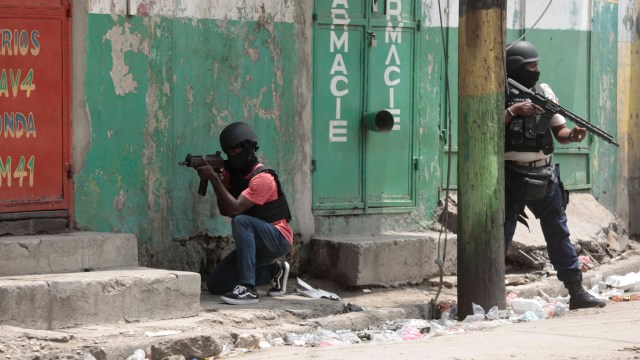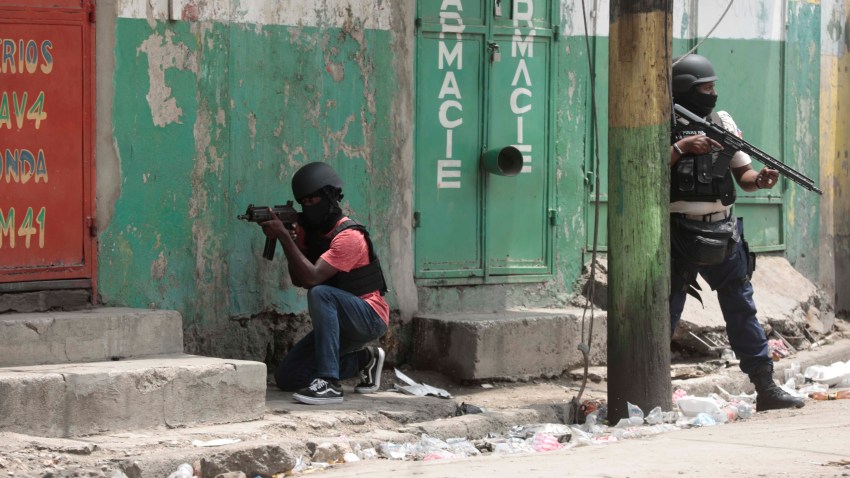Loading your audio article
Hello, everyone. Today at WPR, we’ve got stories on Kenya’s offer to lead a security mission to Haiti and why the attack on the U.S. Capitol on Jan. 6, 2021, was a coup.
U.S.-Iran relations: The United States and Iran have reportedly reached an agreement that will see Tehran free five imprisoned Americans in exchange for the return of several jailed Iranians and access to about $6 billion of frozen Iranian funds to be used for humanitarian purchases. (New York Times)
Our Take: With negotiations to revive the U.S.-Iran nuclear deal—or even reach some sort of “mini-deal” replacement—having been stalled for two years, this new agreement between Washington and Tehran marks the first diplomatic breakthrough between the two sides since U.S. President Joe Biden took office in January 2021.
Members of the Republican Party have already characterized the agreement as the U.S. essentially paying Iran a $6 billion hostage fee. In reality, the funds are existing Iranian assets that had been frozen abroad by U.S. and South Korean sanctions. They will now be parked in Qatar’s central bank under the control of the Qatari government, which will use them to directly pay contracted vendors providing humanitarian aid within Iran.
But however well-crafted the agreement is to avoid delivering a windfall to the Iranian government, it will come with a political cost in Washington. That suggests the Biden administration is willing to follow the shift toward pragmatism when it comes to dealing with Tehran that’s been adopted across the Middle East, with the exception of Israel.
The deal’s immediate payoff, of course, will go to the U.S.-Iranian dual citizens who have been unjustly imprisoned in Iran, as well as to the Iranian population that has borne much of the brunt of U.S. sanctions. The potential long-term payoff would be if the U.S. and Iran can use the momentum from this deal to make progress on negotiations over reimposing limits on Iran’s nuclear program, which remains the best option for avoiding further confrontation and perhaps even conflict between the two sides.

In early August, Kenya volunteered to lead a multinational force to reestablish security in Haiti, pledging to deploy 1,000 police officers to the Caribbean nation. The mission, which would be organized outside the auspices of the United Nations, would represent the foreign intervention that Haiti’s government first pleaded for in October 2022.
As Alessandro Ford writes, though, when Kenya’s assessment team arrives in the country in the coming weeks, it will discover that Haiti’s crisis is not just a policing challenge. It is an urban warfare nightmare.

Kenya’s Police Are No Match for Haiti’s Urban Warfare Nightmare
In early August, Kenya volunteered to lead a multinational police force, to which it will deploy 1,000 police officers. to reestablish security in Haiti. But when Kenya’s assessment team arrives in the country in the coming weeks, it will discover that Haiti’s crisis is not just a policing challenge. It is an urban warfare nightmare. Read more.
Niger is far from the only place to experience a coup over the past few years. Similar ones took place in neighboring Mali and Burkina Faso, as well as in Myanmar. Other countries have seen attempted coups fail, including Turkey and the United States.
That’s right, the United States. Many observers disagree with labeling the attack on the U.S. Capitol on Jan. 6, 2021, a coup attempt. But as columnist Paul Poast writes, the U.S. did in fact experience an attempted coup that day, and one that could well have succeeded.
The Attack on the U.S. Capitol Was an Attempted Coup
At the time of the assault on the U.S. Capitol on Jan. 6, 2021, many observers disagreed with labeling it a coup attempt. Political violence, for sure. Insurrection, perhaps. But a coup? In the United States? In fact, the reluctance to label what happened that day a coup flies in the face of what political scientists know about coups. Read more.

We want to hear your take on the issues we cover.
This week’s question: After the coup in Niger two weeks ago, ECOWAS threatened to intervene militarily if the country’s democratically elected president was not restored by this past Sunday. That deadline has now passed, and so far ECOWAS has only activated a “standby force” for potential deployment to the country. Should ECOWAS intervene in Niger?
For more context:
- Alexander Clarkson wrote that such an intervention would remake regional security.
- Chris Olaoluwa Ògúnmọ́dẹdé wrote that an intervention “is unlikely to yield solutions to [the region’s] problems and could exacerbate them.”
Reply to this email to give us your take, along with your name and where you’re based. We’ll include the best ones we receive in the Daily Review next week. Those selected will also receive a free month of WPR.

Ireland’s government is considering a plan to cull almost 200,000 dairy cows over the next three years in an effort to reach its climate targets, the Financial Times reports. Ireland’s cows are its worst climate offender, but the proposed plan has led many dairy farmers to feel they are being blamed for the country’s slow progress on tackling climate change.
It’s the latest example of how putting pressure on farmers to meet climate goals runs the risk of creating a political backlash. In the Netherlands, for instance, intense opposition to a law that would require Dutch farmers to severely cut their nitrogen emissions led to the rapid rise of the populist Farmer’s Citizens Movement, as Frida Ghitis wrote in April.

The Netherlands’ Farmers Party Is a Wake-Up Call for Europe
April 20, 2023 | The Farmer’s Citizens Movement has surged to popularity in the Netherlands amid protests against new climate change legislation. Read more.
*****
Argentina will hold primary elections this Sunday, a mandatory nationwide vote that will serve as a “temperature check” among voters, many of whom are angry or apathetic against a backdrop of triple-digit inflation and rising poverty.
With current President Alberto Fernandez not seeking reelection, the primary will serve to confirm the country’s economy minister as the ruling Peronist coalition’s candidate, decide a tight race to lead the conservative opposition bloc, and demonstrate whether ultra-right-wing libertarian Javier Milei, who has risen rapidly in the polls, has truly clicked with voters.
Alberto’s Exit Leaves Argentina’s Presidential Election Wide Open
April 28, 2023 | Argentine President Alberto Fernandez announced he would not run in October’s election, amid a deepening economic crisis. Read more.
A Corruption Scandal Could Trip Up Argentina’s Milei
July 20, 2023 | Ahead of an election and amid economic crisis, Javier Milei promised disruption in Argentina. Then a corruption scandal broke. Read more.
That’s all for today’s Daily Review. Coming up, we’re covering Algeria’s ties with China and Iran’s relations with Afghanistan under the Taliban.
Have a great day,
Jakob Cansler
More From WPR
- Federica Rossi on the latest chapter in a decades-old France-Italy dispute.
- Frida Ghitis on Myanmar’s partial pardon of Aung San Suu Kyi.
- Alexander Clarkson on what Europe should learn from the coup in Niger.
- Joshua Kurlantzick on democracy’s regression in Southeast Asia.

